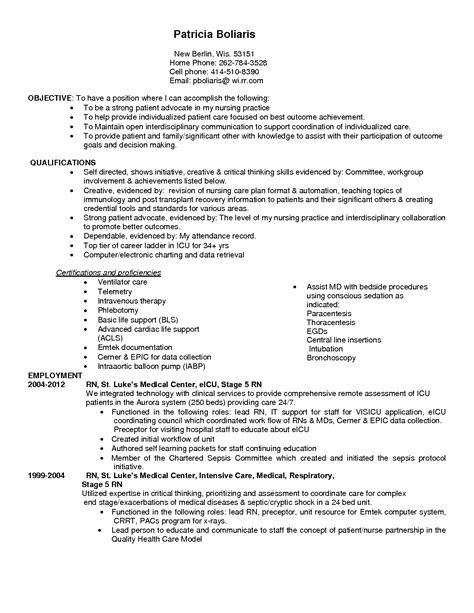Learn how to create a compelling nursing resume by highlighting your critical care skills, experience, education, and certifications for maximum impact.Are you a nurse looking to create a standout resume for a critical care position? Crafting a nursing resume that effectively showcases your critical care skills, experience, and education is crucial for landing your dream job in the healthcare industry. In this blog post, we will discuss the key elements of a nursing resume, the importance of highlighting your experience and education, and how to effectively showcase your critical care skills. Additionally, we will explore the impact of certifications and specialized training on your resume, and how they can set you apart from other candidates. Whether you’re a seasoned critical care nurse or just starting out in the field, this post will provide you with valuable insights on how to create a compelling nursing resume that catches the attention of potential employers. Let’s dive in and learn how to make your nursing resume stand out in the competitive world of critical care nursing.
Key Elements of a Nursing Resume
Creating a nursing resume that stands out requires careful attention to detail and a focus on the key elements that will showcase your skills and experience. It’s important to include relevant experience and education, as well as any certifications and training that demonstrate your expertise in critical care. A well-crafted resume can make a big difference in landing your dream nursing job.
When crafting a nursing resume, it’s crucial to highlight your experience and education in the field. This includes any previous nursing positions you’ve held, as well as any specialized training or education you’ve completed. Emphasizing your experience in critical care settings can set you apart from other candidates and show potential employers that you have the skills necessary to excel in a high-pressure healthcare environment.
In addition to experience and education, certifications and training are also key elements of a strong nursing resume. Whether you’re certified in advanced cardiac life support (ACLS), pediatric advanced life support (PALS), or have completed additional training in specialized areas such as trauma care or neonatal intensive care, these qualifications can help demonstrate your expertise and commitment to ongoing professional development.
Experience and Education
When it comes to preparing a nursing resume that highlights your experience and education, it’s important to focus on the key elements that will make you stand out as a candidate. Your experience section should detail your work history in the healthcare field, including any relevant internships or clinical placements. This is where you can showcase your hands-on experience and the skills you’ve developed in critical care settings.
Additionally, your education section should highlight your academic achievements, including your nursing degree, any specialized coursework or certifications, and any relevant honors or awards. This is where you can demonstrate your theoretical knowledge and commitment to ongoing learning and professional development.
By providing a comprehensive overview of your experience and education, you can effectively showcase your qualifications and expertise in critical care nursing, making you a strong contender for the positions you’re applying for.
Showcasing Critical Care Skills
One of the key elements of a nursing resume is the ability to showcase critical care skills. This section of the resume is where you can highlight your experience and expertise in providing care to critically ill patients. It is important to use specific examples of situations where you have utilized your critical care skills to make a difference in patient outcomes.
Education and training related to critical care should also be emphasized in this section. Whether you have completed specialized coursework or obtained certifications in critical care, be sure to include this information to demonstrate your qualifications in this area.
Additionally, any experience in a critical care setting, such as an intensive care unit or emergency department, should be prominently featured in this part of the resume. Highlighting relevant experiences and responsibilities will show potential employers that you have the necessary skills to excel in a critical care nursing role.
Impact of Certifications and Training
Impact of Certifications and Training
When it comes to building a strong nursing resume, highlighting your certifications and training can have a significant impact on your job prospects. Employers are often looking for candidates who have gone above and beyond the minimum educational requirements and taken the initiative to further their skills and knowledge in the field. By including details of any specialized certifications or additional training programs you have completed, you can demonstrate your dedication to professional development and your commitment to providing high-quality patient care.
Not only do certifications and training programs showcase your willingness to learn and grow within the profession, but they also demonstrate your expertise in specific areas of nursing. For example, advanced cardiac life support (ACLS) certification indicates that you have the knowledge and skills necessary to respond to cardiovascular emergencies, while certifications in critical care nursing or trauma nursing show that you have received specialized training in these high-pressure, high-stakes environments. By highlighting these certifications on your resume, you can set yourself apart as a candidate with the specialized skills needed to excel in critical care settings.
Furthermore, certifications and training can also have a direct impact on your earning potential. Many healthcare facilities offer financial incentives for nurses who hold specialized certifications, recognizing the value that these additional qualifications bring to their teams. In some cases, nurses with specific certifications may also be eligible for higher pay rates or opportunities for advancement within the organization. By including details of your certifications and training on your resume, you can demonstrate to potential employers that you have the qualifications necessary to contribute to their team in a meaningful way, and that you are committed to ongoing professional development.
